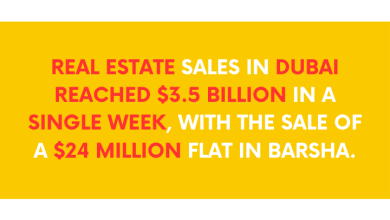Dubai’s Short-Term Rental Market Improving

The UAE’s booming real estate market is giving rise to new homegrown companies in the industry. Silkhaus, a UAE-based proptech, plans to make short-term rentals a multi-billion dollar industry in Dubai and throughout the GCC by providing international institutional and private property owners in the city with up to 40% more income than regular rental options. For more information on real estate trends in the region, check out freehold property in Dubai.
Additionally, Silkhaus has partnered with industry titans from across the world including Airbnb and Booking.com to increase listings on its technologically advanced platform from both customers and property owners, including top corporate organizations in the Middle East.
According to industry experts, the country’s already burgeoning real estate market will receive a new demand boost from the rising high-yielding short-term rental market.
According to Aahan Bhojani, founder and CEO of Silkhaus, “We manage a portfolio of over $120 million in real estate, which keeps expanding, and built industry-leading distribution technologies to cover main worldwide leisure and corporate travel booking portals.”
According to him, institutional real estate owners have become increasingly interested in diversifying their portfolio management techniques with the help of international platforms and operators.
According to Bhojani, an increasing number of foreign investors in real estate who own multiple properties in Dubai also engage with their companies to manage their portfolios.
The chief executive of Silkhaus stated, “More recently, we have witnessed this trend with Chinese buyers who are now returning in numbers to Dubai post-pandemic.

Asia’s short-term rental sector represents a $14 billion opportunity.
According to Bhojani, the increase in travel to the UAE has been very positive and gives her and her company hope for the future of their enterprise and the local economy.
The property market’s steady expansion is another sign of the enormous potential the corporation sees in this industry.
The $14 billion Asia-wide short-term rental sector is the main area of focus for us. Although we have a long way to go, we are still in the early stages of our adventure, Bhojani said, adding that “we are already exceeding market growth for short-term rentals in Dubai.
According to estimates based on the number of Airbnb listings, the short-term rental industry in Dubai has increased on average by 45% annually over the last three years.
On the other hand, Silkhaus said that between Q2 2022 and Q2 2023, its business increased by an astounding 170 percent.
The total addressable market (TAM) for short-term rentals worldwide is predicted to be $110 billion.
The GCC market is still in its infancy and offers many prospects for profit. While well-known tourist locations like Dubai have lower penetration of short-term rentals than other regional towns, which is something we aim to alter, said Bhojani.
The UAE is a year-round market for vacation rentals.
Due to the variety of business and leisure travel to the UAE, according to the founder of Silkhaus, there won’t be any noticeable downtime for the short-term rental market there.
Diverse audience segments visit frequently, with significant increases in Q4 and Q1 when we also benefit from better weather and tourism demand rises as a result.
Bhojani explained the company’s business plan, saying that once real estate partners join the company, they advertise houses on their platform as well as across prominent leisure and corporate travel channels.
This has helped Silkhaus receive consistent traffic from more than 120 different nations.
According to Bhojani, the corporate platform drives high returns for investors by employing technologies such as price automation to optimize income production for its real estate partners.
Our model provides a 20-40% increase in income compared to traditional rental options,” he said.
Silkhaus also works with a huge number of business organizations in the region that prefer to hire furnished flats for their executives during relocations or special projects, him.
“Staying in a Silkhaus means that businesses can save money while ensuring their employees live in high-quality properties in the city’s best neighborhoods,” Bhojani explained.




